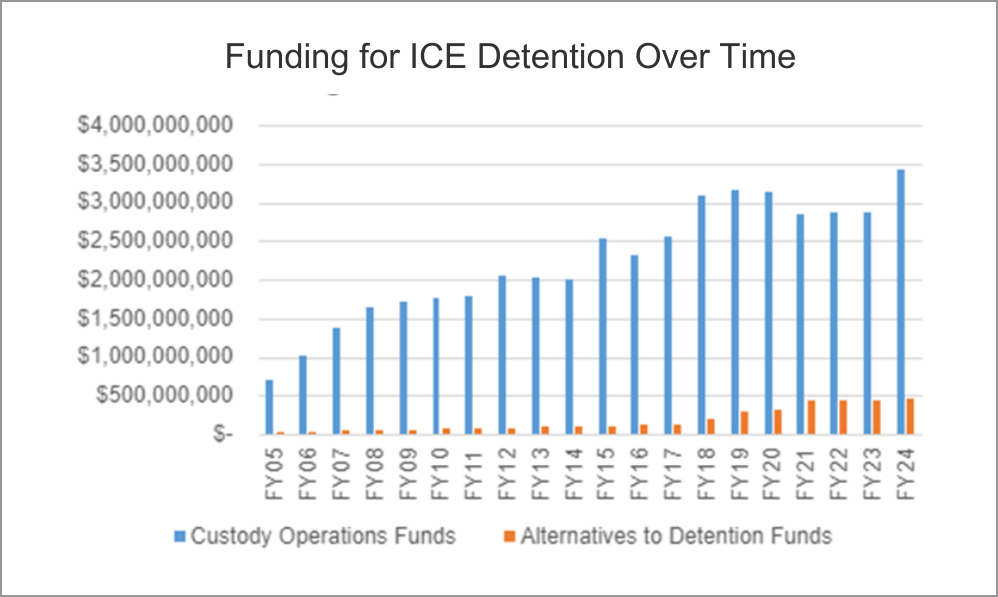The U.S. government spends over three billion a year on the largest immigration detention apparatus in the world to detain and deport people who have lived in the U.S. for decades or who arrived recently seeking safety or a better life. People in detention experience inhumane conditions and rights abuses that include medical neglect, preventable deaths, punitive use of solitary confinement, lack of due process, obstructed access to legal counsel, and discriminatory and racist treatment. The numbers behind the immigration detention system provide a glimpse of the depths of inhumanity experienced on a daily basis by those in detention and the significant public costs, as more taxpayer dollars go towards private prison companies profiting each year off detention contracts. The numbers reiterate the urgent need to halt efforts to expand the system and phase out the use of immigration detention.
Immigration Detention at a Glance
DEATHS IN DETENTION
23 people have died in ICE custody since the start of the Biden administration.
- Twelve of those deaths have occurred over the last year alone, more than double the year before.
- ICE has failed to improve conditions that lead to tragic and largely preventable deaths.
- A June 2024 report examined 52 deaths between 2017 and 2021, finding that 95% of those deaths could likely have been prevented with adequate medical care.
USE OF SOLITARY CONFINEMENT
50% increase since March 2023 in ICE’s use of solitary confinement for people considered members of “vulnerable and special populations.”
-
The average number of consecutive and cumulative days in solitary has more than doubled for this population, which ICE classifies as people who self-identify as LGBTI, have a serious mental or medical illness, are on a hunger strike, or are on suicide watch.
- In solitary confinement, which ICE refers to as “segregation,” people are isolated in small cells with minimal human contact for days, weeks, or years. The practice has a devastating psychological and physical impact, as The New York Times recently reported.
- NIJC continues to call for an end to the use of solitary confinement in immigration detention, and Members of Congress have joined human rights organizations in calling for an end to ICE’s use of the inhumane practice.
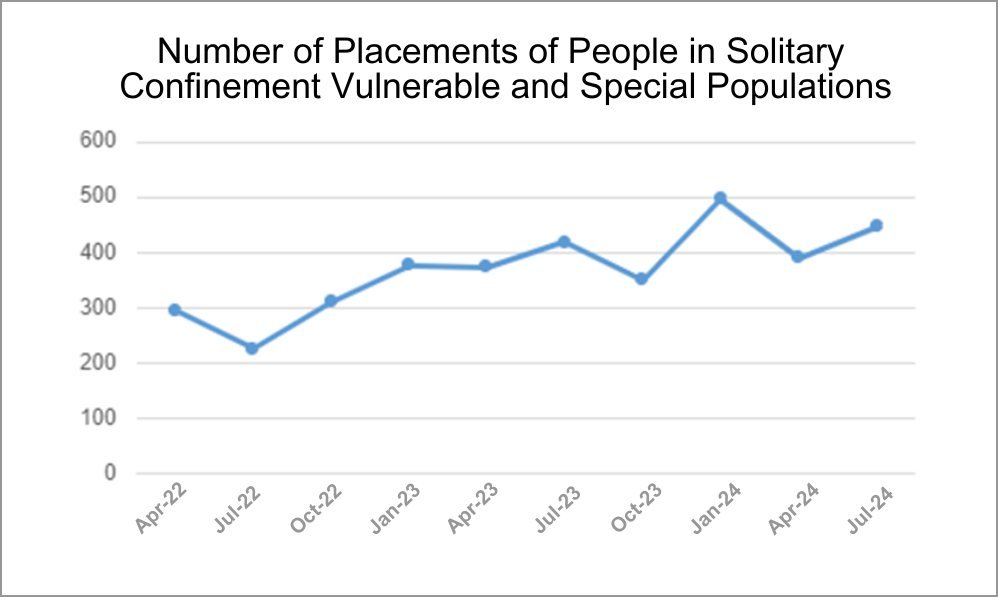
LACK OF DUE PROCESS
60% of people in ICE custody are subject to “mandatory detention,” meaning they do not have a right to a bond hearing to make a case for release, which is basic due process.
-
Data on bond access illuminates racial disparities in ICE detention. Human rights groups have found that Black immigrants are less likely to be released on bond or parole, and are forced to pay much higher bonds.
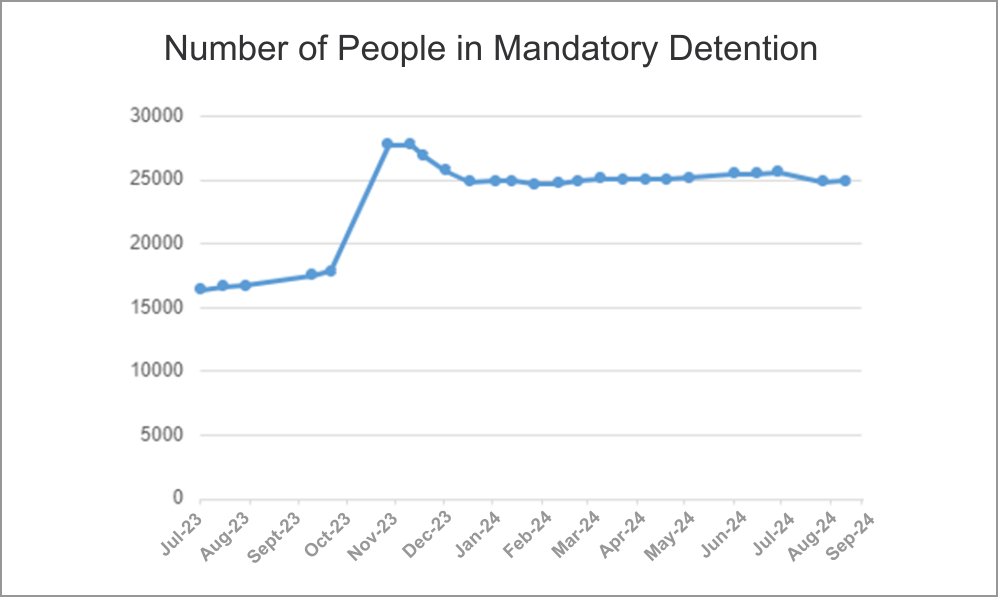
PROFIT-DRIVEN EXPANSION
90% of people in ICE custody are held in detention centers operated for profit by private companies as of July 2023.
- This is a 10 percent increase from the Trump administration.
- ICE’s oversight system permits abuse and stifles accountability, allowing for lucrative contracts to continue with impunity.
MORE PEOPLE DETAINED IN WORSENING CONDITIONS
37,000 people are detained each day on average, an alarming 140% increase from the start of the Biden administration.
- ICE detained more than 260,000 people over the last year alone. This includes people who have lived in the U.S. for decades, parents of U.S. citizens, parents separated from their children, and people who arrived recently seeking asylum or a better life.
- People increasingly protest the abuses they face in detention. As of June 2024, hundreds of people in at least five different facilities were on hunger strikes.
- ICE often responds to protests with threats and physical force, using pepper spray, non-lethal bullets, and sending protesters to solitary confinement.
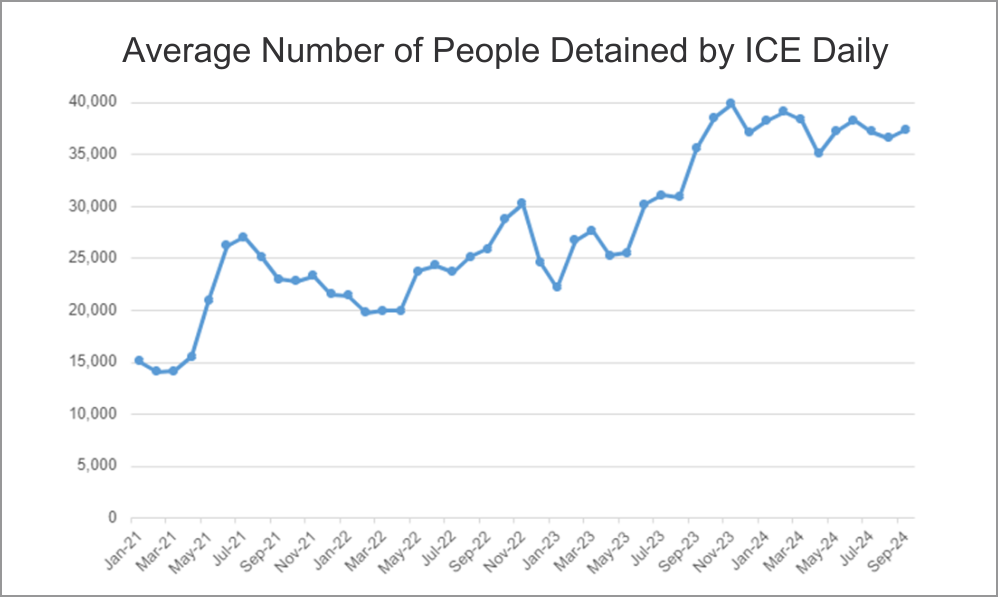
NEW FACILITIES AND CONTRACTS
ICE expanded immigration detention by 50% under the Trump administration.
- During the Biden administration, the U.S. Department of Homeland Security renewed dozens of contracts and entered into new agreements with private prison companies, including opening the Moshannon Valley detention center in Pennsylvania, one of ICE’s 12 facilities that hold over 1,000 people each.
- ICE uses more than 190 different facilities for detention across more than 40 states and U.S. territories. The states with the most people detained by ICE are Texas, Louisiana, California, Arizona and Georgia.
- The Biden administration ended a small number of ICE contracts with some of the most egregious facilities, and ICE terminated agreements in states that banned immigration detention. Now, alarmingly, the Biden administration is seeking to the detention system, issuing solicitations for contracts for new facilities across the country.
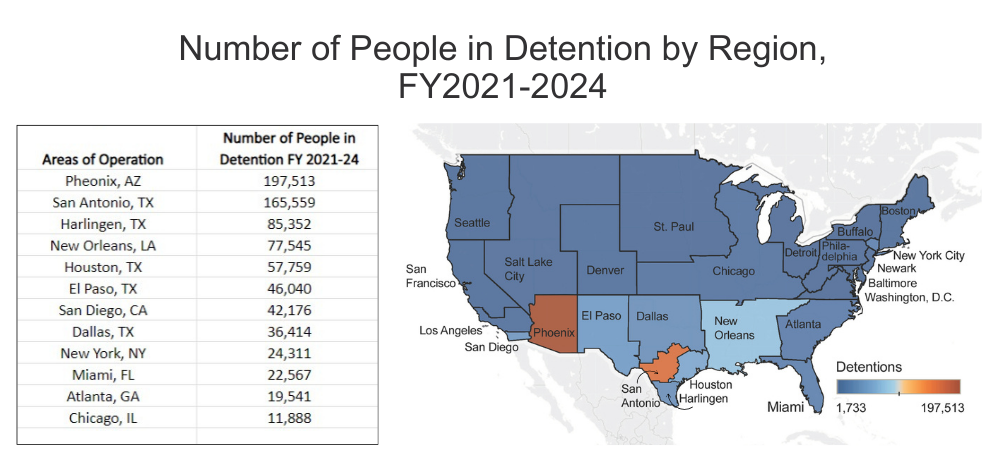
CONGRESSIONAL FUNDING
Yearly funding for ICE detention has skyrocketed to 5 times higher than what it was two decades ago.
- Funding for detention is providing a windfall for private prison companies with enormous human and public costs.
- Congress approved $3.4 billion in taxpayer dollars for fiscal year 2024 for ICE to detain an average daily population of 41,500 people - an increase of $500 million from the prior year.
